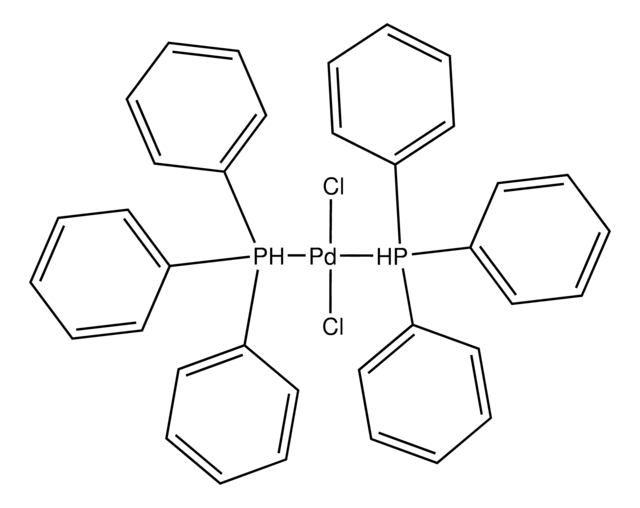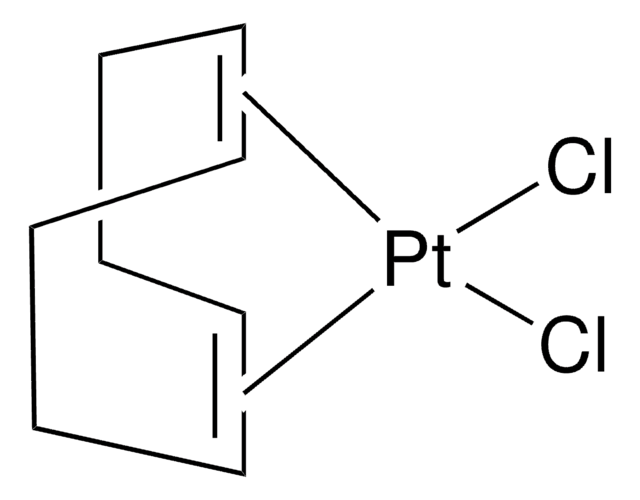223689
Bis(benzonitrile)palladium(II) chloride
95%
Synonyme(s) :
Benzonitrile, palladium complex, Bis(benzonitrile)dichloropalladium(II), Bis(benzonitrile)palladium(II) chloride, Bis(phenylnitrile)dichloropalladium, Dibenzonitrilepalladium dichloride, Dichlorobis(benzonitrile)palladium, Dichlorobis(benzonitrile)palladium(II), Dichlorobis(phenyl cyanide)palladium, Palladium dichloride bis(benzonitrile), Palladium(II) chloride bis(benzonitrile) complex
About This Item
Produits recommandés
Niveau de qualité
Pureté
95%
Forme
powder
Pertinence de la réaction
core: palladium
reagent type: catalyst
Capacité de réaction
reaction type: Buchwald-Hartwig Cross Coupling Reaction
reaction type: Heck Reaction
reaction type: Hiyama Coupling
reaction type: Negishi Coupling
reaction type: Sonogashira Coupling
reaction type: Stille Coupling
reaction type: Suzuki-Miyaura Coupling
Caractéristiques du produit alternatif plus écologique
Catalysis
Learn more about the Principles of Green Chemistry.
sustainability
Greener Alternative Product
Pf
131 °C (lit.)
Autre catégorie plus écologique
Chaîne SMILES
Cl[Pd]Cl.N#Cc1ccccc1.N#Cc2ccccc2
InChI
1S/2C7H5N.2ClH.Pd/c2*8-6-7-4-2-1-3-5-7;;;/h2*1-5H;2*1H;/q;;;;+2/p-2
Clé InChI
WXNOJTUTEXAZLD-UHFFFAOYSA-L
Vous recherchez des produits similaires ? Visite Guide de comparaison des produits
Description générale
We are committed to bringing you Greener Alternative Products, which adhere to one or more of The 12 Principles of Greener Chemistry. This product has been enhanced for catalytic efficiency. Find details here.
Application
- For greener amine synthesis from terminal olefins by Wacker oxidation, followed by transfer hydrogenation of the resultant imine.
- In cross-coupling reactions and α-O-glycosidation.
Formal anti-Markovnikov hydroamination of terminal olefins
Code de la classe de stockage
11 - Combustible Solids
Classe de danger pour l'eau (WGK)
WGK 3
Point d'éclair (°F)
Not applicable
Point d'éclair (°C)
Not applicable
Équipement de protection individuelle
Eyeshields, Gloves, type N95 (US)
Faites votre choix parmi les versions les plus récentes :
Certificats d'analyse (COA)
Vous ne trouvez pas la bonne version ?
Si vous avez besoin d'une version particulière, vous pouvez rechercher un certificat spécifique par le numéro de lot.
Déjà en possession de ce produit ?
Retrouvez la documentation relative aux produits que vous avez récemment achetés dans la Bibliothèque de documents.
Les clients ont également consulté
Notre équipe de scientifiques dispose d'une expérience dans tous les secteurs de la recherche, notamment en sciences de la vie, science des matériaux, synthèse chimique, chromatographie, analyse et dans de nombreux autres domaines..
Contacter notre Service technique




![[1,1′-bis(diphénylphosphino)ferrocène]dichloropalladium(II)](/deepweb/assets/sigmaaldrich/product/structures/130/734/8846aa26-1858-458a-998d-8c306c13bf0f/640/8846aa26-1858-458a-998d-8c306c13bf0f.png)

![[Pd(OAc)2]3 reagent grade, 98%](/deepweb/assets/sigmaaldrich/product/structures/508/249/99a0ef2c-b77c-4d73-8ed9-0cca05b6b41f/640/99a0ef2c-b77c-4d73-8ed9-0cca05b6b41f.png)



